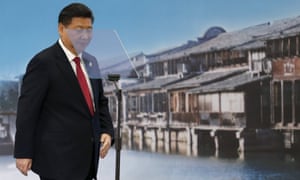Even as prominent free speech advocate is put on trial for online posts, president says governments must respect citizens’ right to exchange ideas

Chinese citizens should have the right to speak their minds on the internet, president Xi Jinping has claimed, just two days after a prominent free speech advocate was put on trial for sending seven tweets.
Speaking at the start of a major Beijing-organised conference on the internet, Xi said it was crucial his nation’s 670 million internet users enjoyed online “freedom”, despite widespread censorship and the blocking of many foreign internet services including Facebook, Twitter, Wikipedia and Instagram.
“As in the real world, freedom and order are both necessary in cyberspace,” Xi told the opening of the so-called world internet conference, taking place over three days in Wuzhen, a town in eastern China.
“Freedom is what order is meant for, and order is the guarantee of freedom. We should respect internet users’ rights to exchange ideas and express their mindsand we should also build good order in cyberspace in accordance with [the] law as it will help protect the legitimate rights and interests of all internet users.”
Hanging over Xi’s 25-minute address was the trial of Pu Zhiqiang, an internet-savvy civil rights lawyer who is facing eight years in prison for seven posts he made on Weibo, China’s Twitter, criticising the Communist party.
Pu went on trial in Beijing on Monday in what campaigners described as a landmark freedom of speech case that will help define what can and cannot be said on the Chinese internet in future.
The outspoken lawyer has 138,000 followers on Twitter and had a similarly large following on Chinese social networks, where his accounts were repeatedly closed by government censors.
Xi’s speech made no direct reference to Pu’s case – which critics have slammed as a “sham trial” – and offered no hint that Beijing would back away from its tight control of the internet.
“Cyberspace is not a place [that is] beyond the rule of law,” the president told delegates from some of the world’s leading tech companies, as well as Russian prime minister Dmitry Medvedev and Pakistani president Mamnoon Hussain.
“Everyone should abide by the law, with the rights and obligations of parties concerned clearly defined. Cyberspace must be governed, operated and used in accordance with the law so that the internet can enjoy sound development under the rule of law.”
Government action was needed to strengthen “civilised behaviour” on the internet, Xi added, calling for measures to “rehabilitate the cyber ecology”.
The president’s comments were live-tweeted by Xinhua, China’s official news agency, and broadcast on YouTube, even though both services are blocked by Beijing.
Activists and supporters of Pu reacted to Xi’s claims about internet freedom with scorn.
“He says he respect our rights, but what he does is the exact opposite,” said Du Yanlin, a dissident who spent a month in detention earlier this year after posting a selfie of himself in Beijing’s Tiananmen Square.
“All his high-sounding rhetoric doesn’t have any meaning,” Du added.
“He says he respects our rights, but Pu Zhiqiang is facing jail simply for writing seven posts on Weibo. I can be placed under detention simply for tweeting from Tiananmen Square.”
Maya Wang, Human Rights Watch’s China researcher, said rather than encouraging Chinese citizens to share their thoughts and ideas, Xi’s three years in power had seen growing intolerance for free speech.
“Under Xi Jinping there has been a very aggressive assault on internet freedom which includes the imprisonment and detention of outspoken [online] opinion leaders.”
Wang said the result was a more cautious Chinese internet that was increasingly devoid of debate over important political and social issues. “People are becoming much more fearful to share their thoughts online,” the activist said.
While Chinese citizens did have right to post large amounts of information on the internet, “everyone knows where the boundaries are”.
[Source:-The Gurdian]
